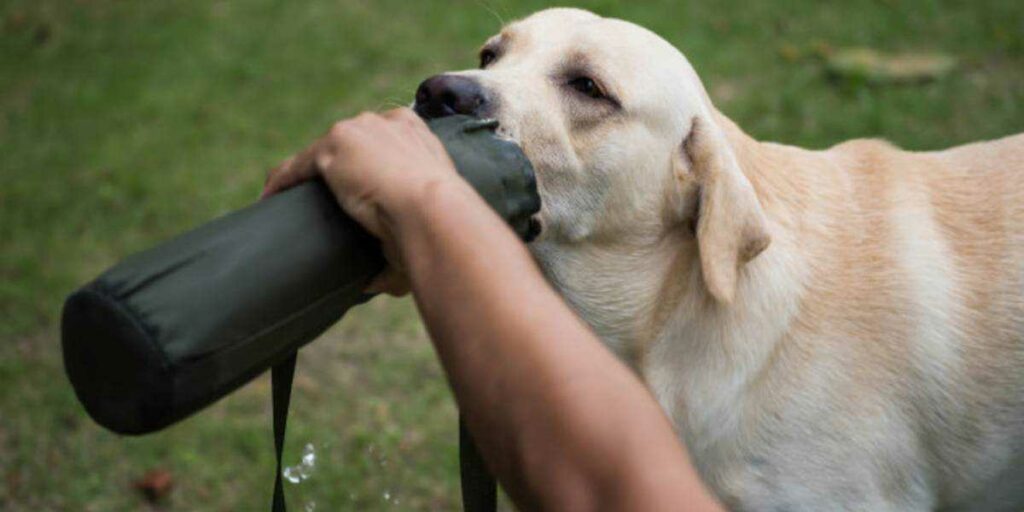Water is the cornerstone of every dog’s diet, and its importance cannot be overstated. Especially for older dogs, dehydration can turn into a serious issue leading to lethargy, kidney failure, and, in extreme cases, even death. To ensure your elderly dog maintains optimal health, understanding their water needs and encouraging regular hydration is crucial.
This guide will offer you insights into how much water your older dog needs, how to recognize their need for hydration, and effective ways to increase their water intake.

Identifying Water Needs for Older Dogs
Adult dogs usually self-regulate their water intake, but factors like aging, illness, or emotional changes can make it harder for them to consume enough water.
Generally, a dog needs between half an ounce to one ounce of water per pound of body weight each day. So, if your senior canine companion weighs 20 lbs and leads a fairly sedentary lifestyle, they will need at least 10 ounces of water a day, which is approximately 1.25 cups. Remember, increased physical activity may require your dog to consume up to double this amount. Therefore, being attuned to your dog’s water needs is pivotal to their health.
Recognizing the Signs of Dehydration in Your Dog
Recognizing the signs of dehydration is key to timely intervention. Watch for distinctive behaviors, such as excessive panting, which could signal heat discomfort or water requirement. Older dogs, particularly those in pain, are prone to dehydration.
Some dogs make it pretty clear when they need water by showing certain behaviors around their water bowl. However, if these signals aren’t apparent, a physical check of their nose, gums, and skin is necessary. If you find the nose dry or gums pasty, or if the skin on the neck appears elastic, your dog might be dehydrated. Immediate consultation with a veterinarian is recommended when you notice such signs in your older dog.
Effective Strategies to Boost Water Intake
To help your dog avoid dehydration, try the following strategies:
- Ensure Water Availability: Place a water bowl in every room your dog spends time in.
- Refresh Regularly: Keep refreshing the water bowl to maintain freshness.
- Incorporate Water in Meals: Add water to their food bowl or increase the water content in home-cooked meals.
- Offer Delicious Broths: Serve homemade soups using dog-friendly, low-sodium broths to stimulate their appetite.
- Ice Cube Treats: Give ice cubes as a treat, but use this sparingly for senior dogs with sensitive stomachs.
- Train for Hydration: Teach your dog to drink water on command or from your hand.
- Stimulate Interest: Initially, let your dog lick water from your finger dipped in the water bowl to trigger their interest.
- Establish a Hydration Schedule: Set specific hydration times, much like feeding times, so your dog can anticipate it.
If your senior dog still isn’t drinking enough water despite these strategies, it’s best to consult with your veterinarian.
Special Considerations for Older Dogs and Hydration
An older dog’s powerful scent detection can distinguish fresh water from stale, affecting their willingness to drink. Dogs with more sensitive digestive systems or illnesses may refrain from drinking water if it smells off.
One simple solution is to keep a water bowl where you spend a lot of time. As your senior dog is likely to stay close to you, they will have easy access to water.
Building upon your bond with your dog can also help. For instance, letting your dog lick water from your palm, which carries your scent, can comfort them.
Traveling can stress dogs, making them avoid drinking. Setting a hydration schedule and using command words can encourage them to drink during travel. Understanding your dog’s signs of stress, pain, and discomfort is part of ensuring sufficient hydration and maintaining their overall well-being.
Conclusion
Ensuring your senior dog stays hydrated is a crucial aspect of pet care. Being aware of their daily water needs, recognizing signs of dehydration, and using practical strategies to increase their water intake are all part of this. Remember, your attention and care can make a huge difference in your furry friend’s life, contributing to their health, happiness, and longevity.

Jay
Jay is a health and wellness enthusiast with expertise in water quality and nutrition. As a knowledgeable advocate for holistic well-being, Jay successfully manages Type 2 Diabetes through informed lifestyle choices. Committed to sharing reliable and authoritative insights, Jay combines firsthand experience with a passion for enhancing health."
